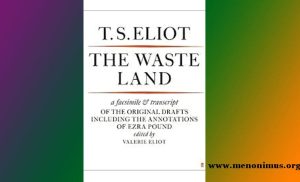The Waste Land | T S Eliot | A Review
The Waste Land | T S Eliot | A Review
“The Waste Land” by T. S. Eliot stands as one of the most celebrated and complex poems of the 20th century, noted for its intricate structure, diverse literary allusions, and its profound exploration of disillusionment, fragmentation, and the search for spiritual renewal in a post-World War I world. Published in 1922, this masterpiece of modernist poetry is divided into five sections: “The Burial of the Dead,” “A Game of Chess,” “The Fire Sermon,” “Death by Water,” and “What the Thunder Said.”
Structure and Fragmentation:
The poem’s structure is fragmented, mirroring the fractured nature of the modern world it portrays. Eliot uses a variety of poetic forms, voices, and perspectives, often without clear transitions, resulting in a disjointed narrative that reflects the societal disintegration after the war. This fragmentation serves to convey the poem’s theme of disillusionment and highlights the difficulties of finding meaning and coherence in a world that seems to have lost its sense of unity and purpose.
Literary Allusions:
Eliot weaves a tapestry of literary, mythological, and religious references throughout the poem. These allusions come from sources as diverse as Dante’s “Inferno,” Shakespeare’s “The Tempest,” the Hindu Upanishads, and the Bible. These references add layers of meaning and complexity to the poem, inviting readers to engage with multiple interpretations and perspectives.
Themes and Motifs:
Disillusionment and Desolation: The aftermath of World War I left a sense of disillusionment and emptiness in society, which is reflected in the poem’s exploration of emotional and spiritual desolation.
Spiritual Barrenness and Redemption: The wasteland symbolizes spiritual decay, a world devoid of fertility and growth. The poem seeks redemption through spiritual renewal and transformation.
Sexuality and Gender Roles: The poem addresses complex issues related to sexuality, infidelity, and the degradation of human relationships. The “A Game of Chess” section, for instance, draws attention to the objectification and disempowerment of women.
Journey and Quest: Eliot’s characters embark on quests for meaning, redemption, and self-discovery. These journeys parallel the speaker’s search for a deeper understanding of the human condition.
Imagery and Language:
Eliot’s use of vivid and often shocking imagery contributes to the poem’s impact. He employs symbolism, metaphors, and sensory details to evoke a sense of the desolate and fragmented world he envisions. The poem’s language is both poetic and prosaic, blending high and low registers to create a diverse linguistic texture that mirrors the multifaceted nature of modern experience.
The Epigraph and Opening:
The poem opens with a Latin epigraph from the Roman poet Virgil’s “The Aeneid.” The epigraph sets the tone for the poem’s exploration of journeys and quests. The opening lines—”April is the cruellest month…”—establish the sense of paradox and ambiguity that characterizes the poem, as well as its thematic focus on death and rebirth.
Conclusion
“The Waste Land” is a dense and challenging work that demands careful reading and interpretation. It captures the disillusionment and fragmentation of the post-World War I era while delving into universal themes of spirituality, redemption, and the search for meaning. T. S. Eliot’s masterful use of literary allusions, vivid imagery, and intricate structure creates a poetic mosaic that continues to intrigue and resonate with readers, inviting them to grapple with its complexities and discover new layers of insight with each encounter. 0 0 0.
The Waste Land T S Eliot A Review
You May Like: The Satanic Verses by Salman Rushdie-A Review
N. B. The article ‘The Waste Land T S Eliot A Review’originally belongs to the book ‘The Reviews of Epic Literature Around the World Vol-I‘ by Menonim Menonimus.








